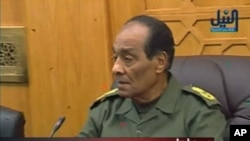Egypt's military rulers have appointed a retired judge to head a committee tasked with amending the constitution to allow for democratic elections later this year.
Former Egyptian judge Tareq el-Bishri will lead the eight-member panel, which also includes sitting judges, legal experts, and former lawmaker Sobhi Saleh of the banned Islamist group, the Muslim Brotherhood. The panel held its first meeting Tuesday with the leader of Egypt's military council, Hussein Tantawi.
Pro-democracy activists who met with the council Sunday say it promised them the constitutional amendments will be drafted in 10 days and put to the public in a national referendum within two months.
A new constitution is one of the key demands of Egypt's opposition, which forced authoritarian president Hosni Mubarak to step down last week after 30 years in office and transfer authority to the military. The previous charter, suspended by the military, had provisions to keep Mr. Mubarak and his allies in power.
|
VOA Cairo Correspondent Elizabeth Arrott speaks with Middle East Monitor Host Susan Yackee:
|
Opposition groups have called for democratic reforms that would enable more candidates to run for the presidency, impose term limits on the post, and enable more political parties to be formed.
Egypt's Muslim Brotherhood said Tuesday it plans to establish itself as a party as soon as the ruling military scraps a law that has outlawed their Islamist movement for years. The Brotherhood is the country's best-organized opposition group.
Critics of the group in Egypt and the West have expressed concern that it could come to power through democratic elections and attempt to transform the country into an Islamic state. The Brotherhood says it is committed to working within a multi-party political system and will not seek the Egyptian presidency.
Another challenge facing Egypt's military leadership is a wave of strikes by Egyptian workers that have threatened to further weaken an economy that was largely paralyzed during the 18-day uprising that ousted Mr. Mubarak.
Egyptian Foreign Minister Ahmed Aboul Gheit appealed Tuesday for international assistance for his nation's economy, which he said has been severely affected by its political crisis. He made the appeal in phone calls to his American, British and Saudi counterparts.
Egypt's top diplomat is a member of the caretaker government assigned by the military to manage state affairs in a transitional period before new elections.
Egypt's military council also issued a communique Monday urging labor leaders to end the unrest, warning that ongoing strikes threaten the economy's recovery prospects. But, it stopped short of banning strikes and other protest actions.
Among the more prominent groups involved in full or partial strikes across Egypt are police officers, textile workers, cement laborers, public bank and municipal employees, oil and gas workers and bus drivers. Workers cite a series of grievances, including corruption and the need for better pay.
















